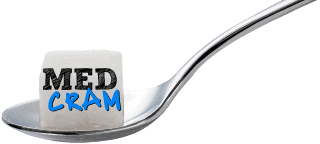In this video, Dr. Seheult of MedCram discusses diets that may reduce slow wave sleep. We like to think about these in a linear manner; however, in reality each can affect the other. This can lead to a vicious cycle where bad sleep can lead to a bad diet and a bad diet can lead to bad sleep.
Stages of sleep
How does diet affect sleep? When someone goes to sleep, there are several stages. It starts with REM sleep and then the four stages of sleep 1-4. Stages 3-4 are where slow wave sleep occurs. It is important for physical restorative sleep and where memory consolidation occurs. It is also associated with the secretion of growth hormone. Ideally it is best to try and maximize slow wave sleep as much as possible. As we get older, slow wave sleep tends to go away and we end up getting more stage 2 sleep which is mostly sleep but without all of the good benefits of slow wave sleep. REM sleep is mentally restorative.
What does slow wave sleep suppression do?
A study in 2008 that discussed slow-wave sleep and the risk of type 2 diabetes in humans showed that in young healthy adults, if slow wave sleep was suppressed without any change in sleep time, there was a marked decrease in insulin sensitivity without adequate compensatory increase in insulin release which led to reduced glucose tolerance and increased diabetes risk. After three nights of slow wave sleep suppression, insulin sensitivity declined.
What does diet due to sleep?
In regards to unhealthy diets, this study in 2023, took 15 objects in good health with a stable weight, a regular sleep-wave pattern, and a regular daily meal pattern with three main meals. It was a randomized study and each subject acted as their own control. They were randomized to a high fat, high sugar diet x 7 days and then over to a low fat, low sugar diet x 7 days after a 7 week washout. The meals were isocaloric for each individual. Looking at the slow wave sleep pattern, there was a statistically significant difference between the low fat and the high fat diet. In the low fat diet, there was a statistically significant higher amount of slow wave sleep. The study concluded that exposure to the more unhealthy diet could impact several sleep parameters that are known to be associated with the restorative properties of sleep in humans.
Another study in 2023 looked at how a single night of moderate at-home sleep restriction increased hunger and food intake in overweight young adults. They took 15 overweight adults and had a first night of regular sleep and then did restricted sleep of 6 hours in bed the next day. They found energy intake was increased the day after night 2 with increased fat and protein intakes and feelings of hunger. Systolic blood pressure was higher and heart rate faster in the morning after night 2.
We need to be working on getting a good night’s sleep and getting a good night’s rest. MedCram does have sleep courses on its website to help if you need it including on insomnia.
LINKS / REFERENCES:
Slow-wave sleep and the risk of type 2 diabetes in humans (PNAS) | https://www.pnas.org/doi/10.1073/pnas…
Exposure to a more unhealthy diet impacts sleep microstructure during normal sleep and recovery sleep: A randomized trial (Obesity) | https://onlinelibrary.wiley.com/doi/f…
A single night of moderate at-home sleep restriction increases hunger and food intake in overweight young adults (Nutrition) | https://www.sciencedirect.com/science…
Sleep Medicine (MedCram) | https://www.medcram.com/collections/s…
